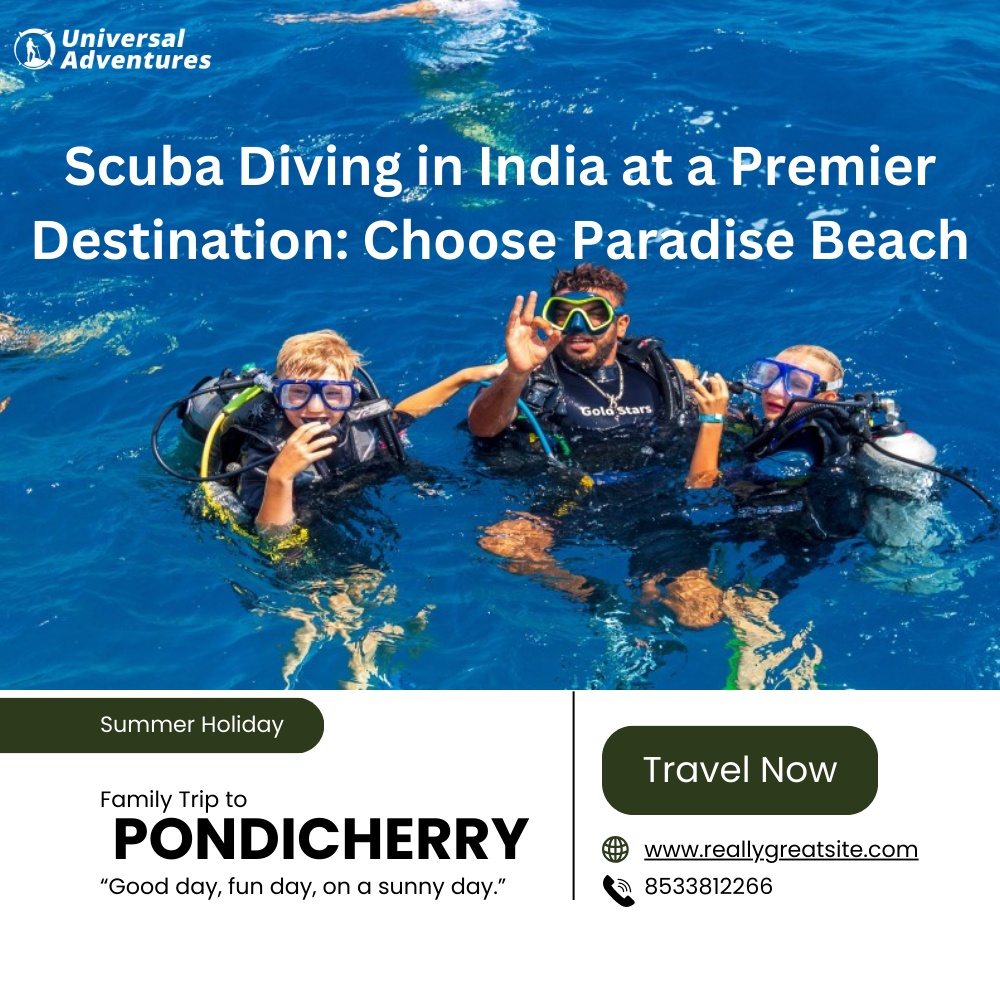
When it comes to scuba diving in India, few places rival the allure of Paradise Beach. Located in the idyllic coastal town of Pondicherry, Paradise Beach is a premier destination for diving enthusiasts looking to explore the rich marine biodiversity of the Bay of Bengal. The beach's name is no exaggeration; its golden sands, crystal-clear waters, and vibrant coral reefs truly feel like a slice of paradise. Whether you're a seasoned diver or a beginner eager to experience the underwater world, Paradise Beach offers the perfect blend of adventure, beauty, and tranquility. Dive beneath the surface, and you'll be greeted by an underwater wonderland teeming with colorful marine life, making it an unforgettable destination for scuba diving in India.
What's the Best Time to Plan for Scuba Diving in Pondicherry?
The best time to plan for scuba diving in Pondicherry is between October and March. During these months, the weather is typically favorable, with clear skies, calm seas, and excellent underwater visibility ranging from 10 to 20 meters. The water temperature remains comfortably warm, between 26°C and 30°C (79°F to 86°F), eliminating the need for heavy wetsuits.
May it be snorkeling in Pondicherry or scuba diving so these conditions provide a more enjoyable and comfortable diving experience, allowing you to appreciate the vibrant marine life and stunning coral reefs fully. In contrast, the monsoon season from June to September brings heavy rains and rough seas, which can negatively impact visibility and make diving conditions challenging. By choosing to dive between October and March, you maximize your chances of experiencing the best of Pondicherry’s underwater world.
Tips and Guidelines for Scuba Diving In Pondicherry Beach
Scuba diving in Pondicherry Beach is an exciting and immersive activity, but it requires careful preparation and adherence to safety protocols. Here are some essential tips and guidelines to ensure a safe and enjoyable diving experience:
1. Get Proper Certification
- Obtain certification from a recognized agency such as PADI (Professional Association of Diving Instructors) or SSI (Scuba Schools International). Certification ensures you have the necessary skills and knowledge for safe diving.
2. Check Equipment Thoroughly
- Before each dive, inspect your gear to ensure everything is in good working condition. This includes your mask, fins, wetsuit, BCD (Buoyancy Control Device), regulator, and tanks. Properly fitting equipment is crucial for comfort and safety.
3. Plan Your Dive
- Discuss the dive plan with your buddy or dive group. Know the dive site, expected conditions, maximum depth, and duration. Agree on signals and emergency procedures.
4. Equalize Frequently
- Equalize your ears frequently during descent to prevent discomfort and potential injury. Pinch your nose and gently blow to equalize pressure.
5. Monitor Your Air Supply
- Keep a close eye on your air gauge and ensure you have enough air to complete your dive safely. Follow the "rule of thirds": use one-third of your air for the dive out, one-third for the dive back, and keep one-third as a reserve.
6. Ascend Slowly
- Make your ascent slowly and in stages to allow your body to off-gas nitrogen safely. A slow ascent minimizes the risk of decompression sickness (the bends).
7. Stay Hydrated and Avoid Alcohol
- Drink plenty of water before and after your dive to stay hydrated. Avoid alcohol, as it can increase the risk of dehydration and impair your judgment.
8. Follow Safety Stops
- Adhere to safety stops during ascent, typically at 5 meters (15 feet), for 3 minutes. This helps in the gradual release of nitrogen from your body.
9. Respect Marine Life
- Observe marine life from a distance and avoid touching or disturbing the creatures or their habitats. This helps protect the delicate underwater ecosystems.
10. Know Your Limits
- Dive within your training and experience level. If you're unsure about the conditions or your ability to handle them, it's best to choose a more manageable dive site or seek guidance from a professional.
11. Dive with a Buddy
- Always dive with a buddy or in a group. This ensures you have assistance in case of emergencies and makes the dive experience more enjoyable and safer.
12. Understand Local Conditions
- Research the dive site conditions, such as currents, water temperature, and visibility, to prepare adequately. Local dive operators often provide valuable information about the site.
13. Carry Emergency Supplies
- Have a dive knife, signaling devices (like a whistle or dive light), and a surface marker buoy (SMB) for safety. These tools can be crucial in emergencies.
Conclusion:
To experience the best scuba diving in India which offers a quintessential blend of stunning natural beauty and captivating marine life with its crystal-clear waters, vibrant coral reefs, and diverse aquatic species visit Paradise Beach. This spot provides an exceptional diving experience for enthusiasts of all levels. The serene environment, coupled with the beach's idyllic setting, ensures a memorable underwater adventure and a perfect escape from the everyday hustle.
